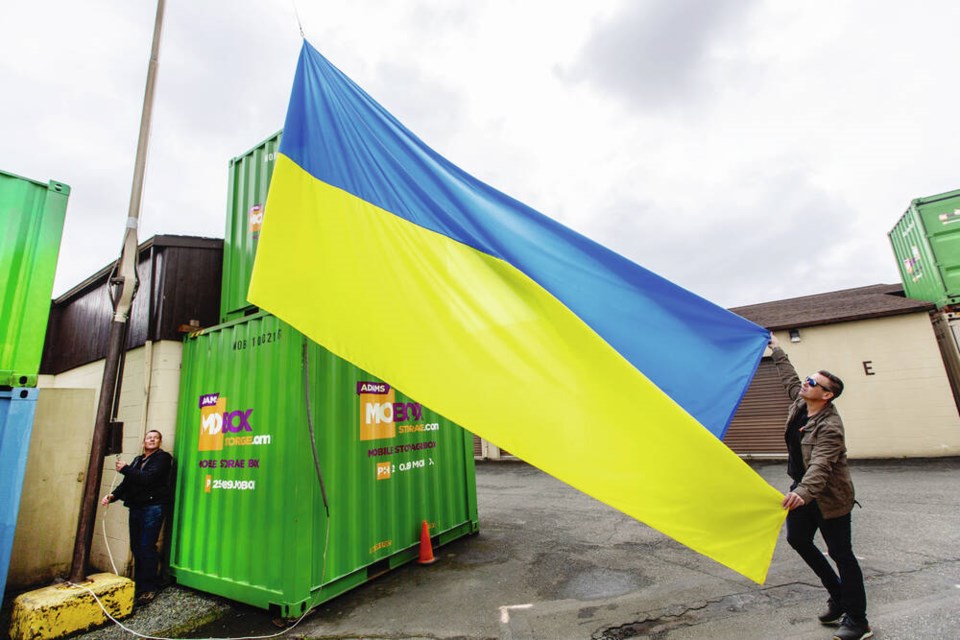At Victoria’s Ukrainian Cultural Centre, they just sent over money to buy 25 bulletproof vests for paramedics back in the old country.
Now they brace for the flood of people coming the other way.
About 500 Vancouver Island families have volunteered to host displaced Ukrainians, but no one knows how many of the latter will come here, says the centre’s office manager, Victoria Grando. Nor has anyone answered a big question: Who will pay?
This week, Ottawa unveiled measures designed to speed Ukrainians’ entry to Canada, hacking through red tape in a way that should allow applicants to start arriving in a couple of weeks. While the regulatory changes are appreciated, many questions remain unanswered, a lot of them having to do with money.
“Who’s going to pay for airfare?” Grando asks. The mothers and children who fled Ukraine did so in a hurry, finding themselves in foreign countries with bank cards that no longer worked. Even with visas, how are they supposed to get to, and live in, Canada?
Normally, refugees arrive here with permanent-resident status, having gone through a lengthy vetting process during the months or years they spent stranded outside their homelands. That’s not happening under the expedited process. And because that’s not happening, it’s not certain whether the Ukrainians will qualify for coverage extended to those officially categorized as refugees.
One example: At the cultural centre, they talk about a Ukrainian woman who wants to come to Vancouver Island but who is 29 weeks pregnant. If she were an official refugee, she would have permanent resident status and would therefore have her medical bills covered, just like the rest of us. Without it, she’s looking at a hit that would stagger any of us, let alone a woman coming to a strange country with nothing but the clothes on her back.
Similarly, Ottawa normally funds language and settlement programs offered by the Inter-Cultural Association of Greater Victoria, but only for those who have permanent resident status. Will the Ukrainians qualify?
The same question is being asked at the Vancouver Island Counselling Centre for Immigrants and Refugees, which offers low- and no-cost counselling to newcomers with mental-health challenges.
Ottawa usually funds a year of care for refugees.
Whether the funding is there or not, the counselling centre is already gearing up for an influx. It has hired a Ukrainian-speaking psychologist and a couple of Ukrainian-speaking students. Two translators have been teed up to assist English-speaking counsellors. Preparations are being made for new therapy and support groups.
The counselling centre’s co-founder, Adrienne Carter, says there is already depression and anxiety among the Island’s existing Ukrainian- and Russian-speaking populations. “Most of them have family back home.”
She also says survivors of conflicts elsewhere in the world are having old nightmares emerge. Carter herself remembers being a 12-year-old building street barricades with her father during the Hungarian uprising of 1956. “The Russian tanks rolled in and destroyed everything.” She remembers sheltering in the basement of her apartment building as explosives rained down. “It’s still very, very clear.”
So, she expects many of those arriving from Ukraine will need the centre’s help. That will be tough on Carter’s organization, as its current clients already need more counselling than Ottawa pays for.
“The funding has not been very adequate at all, but we were managing.” The centre, which has charitable status, hopes donors will step up.
That’s where we’re at. Everybody — governments, non-profits, faith-based groups, individuals — is scrambling to clear a path to Canada for displaced Ukrainians, but coping with a massive, unexpected, evolving humanitarian crisis isn’t simply a matter of flipping a switch. The first steps have been good, but this voyage is only beginning. All hands on deck.



